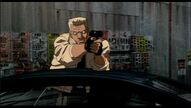Cyberpunk-a combination of cybernetics and punk, is a branch of science fiction, usually depicting a highly technologically developed dystopian society. The first cyberpunk work I came into contact with was "The Matrix", but because of its strong commercial color, the genre of the work itself was ignored. It was not until the "Ghost in the Shell" series that I really realized that The existence of this independent branch of "Bopunk".
It is generally believed that the term cyberpunk was carried forward by William Gibson's "Neuromancer". Gibson's works also set a classic definition of cyberpunk style: High Tech, low life (High Tech, low life). On one side is the staggering high-tech development: bionics, neural networks, artificial intelligence, virtual reality..., on the other side is the terrible real world: dilapidated hotels, crowded people, continuous rain, neon flashing, the protagonist often endures Loneliness and pain, wandering through the world in a Chandler-style tough guy style.
This kind of contrast is not created, but the inevitable development of cyberpunk style. Bruce Sterling, who first created the concept of "cyberpunk", defined it as follows:
"Treat people like rats, and all measures against rats can be imposed on people equally. Closing your eyes and refusing to think will not make this terrible picture disappear. This is cyberpunk.
-What is cyber?-My
first experience of watching "Ghost in the Shell" can only be described as "stunning". This comic series began in 1989, and was later approved by Kenji Kamiyama. Oshii Mamoru’s animation shows a grand, advanced and sophisticated world view: the prosthetic technology that uses mechanical parts to replace body organs is widely used. The electronic brain and the network world are completely connected. The boundary between human and machine is gradually blurred. It is distinguished by the presence or absence of "Ghost." After that, I realized that there were similar plots in "Neural Wanderer" and "Blade Runner" before being slightly disenchanted. However, "Ghost in the Shell" gave full play to the advantages of animation works. The imagination of the works of the predecessors turned into exquisite works of art and deepened its philosophical thinking. This achievement is undeniable.
In "Neuromancer", the electronicization of human organs is commonplace. The protagonist Case is a "cyber cowboy" who can connect his nervous system to the global computer network and travel freely in the ocean of information, but after betraying his employer, a Russian toxin destroys his nervous system and becomes a useless person. And a mysterious man named Armitage found him and spent a lot of money to re-implant his nerves and organs so that he could work for himself. But in fact, Case does not want to dominate the world. He hopes to transcend the shackles of the flesh, escape the ruins of the real world, and wander in the digital space. This last point was realized at the end of the 95th version of "Ghost in the Shell" theatrical version of Motoko Kusanagi. In "Innocent", he wandered freely in the endless cyberspace.
"Human beings themselves are constantly changing, and the "ego" that hopes to maintain the self has been restricting you... I am connected to a huge network, and I am only a small part of it.
For you who have not yet been exposed to experience In other words, maybe it can only be perceived as a light. We were all tied together in a corner, so we need to be next to each other. Although all our aggregates depend on only a few functions, it is time to break through the barriers that bind us. The shackles, ascend to a higher level of structure.
——The
plot that the puppet master hopes to combine with the element in the 95 version of the puppet master seems to be inherited from the AI "Winter Ji" in "Neural Wanderer" and another AI "neural wanderer" Combination. Not to mention the ice wall defense system in "Neuromancer" should also affect the concept of offensive defense against intruders in "Ghost". In short, in the 1970s and 1980s, when network technology was not yet developed, Gibson , Dick and others geniusly predicted the existence and possible form of virtual space on the Internet, and it has been continuously used by later generations. The greatness of "Neuromancer" and "Blade Runner" is not only in their own wonderfulness, but also in their greatness. It laid the framework and tone for future genres.
Oriental elements in cyberpunk
If you often watch cyberpunk works, you will easily find that Eastern elements often shine in such works. It seems that this kind of work can't be called a typical cyberpunk work without the Chinese or Japanese figure and language.
The public is more familiar with the Chinese martial arts in The Matrix. The martial arts director of "The Matrix" is Yuan Heping. The martial arts movements in the movie, as well as the martial arts concept, "quick fight" and "no tricks to win," are all typical Chinese martial arts characteristics.
In "Blade Runner", the Chinese Lao Zhou, who designed artificial human eyes, is played by Chinese actor Wu Hanzhang.
The northern city in "Ghost in the Shell: Innocence" is an extremely gorgeous, splendid, modern and ancient worship event, paired with the music of "Puppet Ballad", and it has become one of the most memorable scenes in the film.
So, why do cyberpunk works favor Oriental elements so much? On the one hand, this may be the natural curiosity of Westerners in the distant East, hoping to join in to add mystery to the work; on the other hand, what cyberpunk originally pursued is the alienation and impact of technology on traditional human society. The blending of cultures that break boundaries, the beginning of greed and ambition, the interlacing of success and loss, the crowding and suppression of population explosions, various illegal transactions, drugs, crimes, etc. under the background of modern anomie, such scenes, in Eastern societies that have been impacted by Western modernization are the easiest to find.
Before the economic bubble burst in 1988, the mecca of cyberpunk was Japan. The writers at that time undoubtedly believed that Japan would surpass the United States in terms of technology and economy to rule the world; and after the bubble burst, the sacred place of cyberpunk moved to Hong Kong. First of all, Hong Kong visually fits the image of cyberpunk, and its population density Great, there are many shops, both the bustling Victoria Harbour and the dilapidated Kowloon Walled City. The second reason is that although Hong Kong is a global financial center and a rapidly developing international metropolis, it is unique. The socio-political and historical background: After the Opium War, he has been infiltrated by Western culture for a long time, but it cannot completely erase the influence of traditional Chinese culture. As a "free port", it has naturally become a paradise for Eastern and Western adventurers, as well as various cultural Blendingly. Before the Sino-British negotiations decided to change hands in 1997, Hong Kong people have been in the anxiety of identity, which is consistent with the theme of survival in the cracks of cyberpunk works and the ambiguity of identity.
-Cyberpunk and the modern world-
Whether it is hippie culture or hip-hop culture, every subculture with a rebellious spirit will eventually be digested and absorbed by consumerism, and so is cyberpunk. Towards the end of the 1990s, the concrete representation of cyberpunk in images—mostly derived from Japanese animations such as "Akira" and "Ghost in the Shell"—was well known to the public. As for Hollywood blockbusters like "The Matrix", cyberpunk is also being discussed. In the literary world, cyberpunk is no longer a determined style of holding high the banner of rebellion. It has long been played by a variety of novelists who have copied Gibson but lost their character, and has become one of the most uninspiring genres in science fiction.
In my opinion, it is not only consumerism that destroys cyberpunk in literature, but also the rapid development of modern technology. Artificial intelligence, VR, AR... all kinds of fictional concepts that originally appeared only in cyberpunk have become popular. Although reality is not as perfect as imagined, the scientific theoretical foundation and solid technical operation also provide people with enough Enough imagination is better than the vague ideas of cyberpunk writers.
"I think this is already a reality. Everyone here has a mobile phone... I do, too. Now it's just a
matter of putting a mobile phone in your brain. Whether it's in your pocket or your brain, you won't be able to live without it anyway. This is why I say that humans must adapt to technology...
It may only be in your pocket, but it is actually part of your body.
-Oshii Mamoru
When we spend more and more time on the Internet On the other hand, when the connection between people can also be replaced by social software, haven’t we actually finished uploading part of the consciousness on the Internet? The dystopian scene that cyberpunk is worried about has already appeared, and it will only become more in the future. Strengthen, by then, we may still have to look back and worship these great prophets, and the secret to the end has been revealed in
one word. The more you come from the world, the more you are Nai Rongdi
View more about Ghost in the Shell reviews










